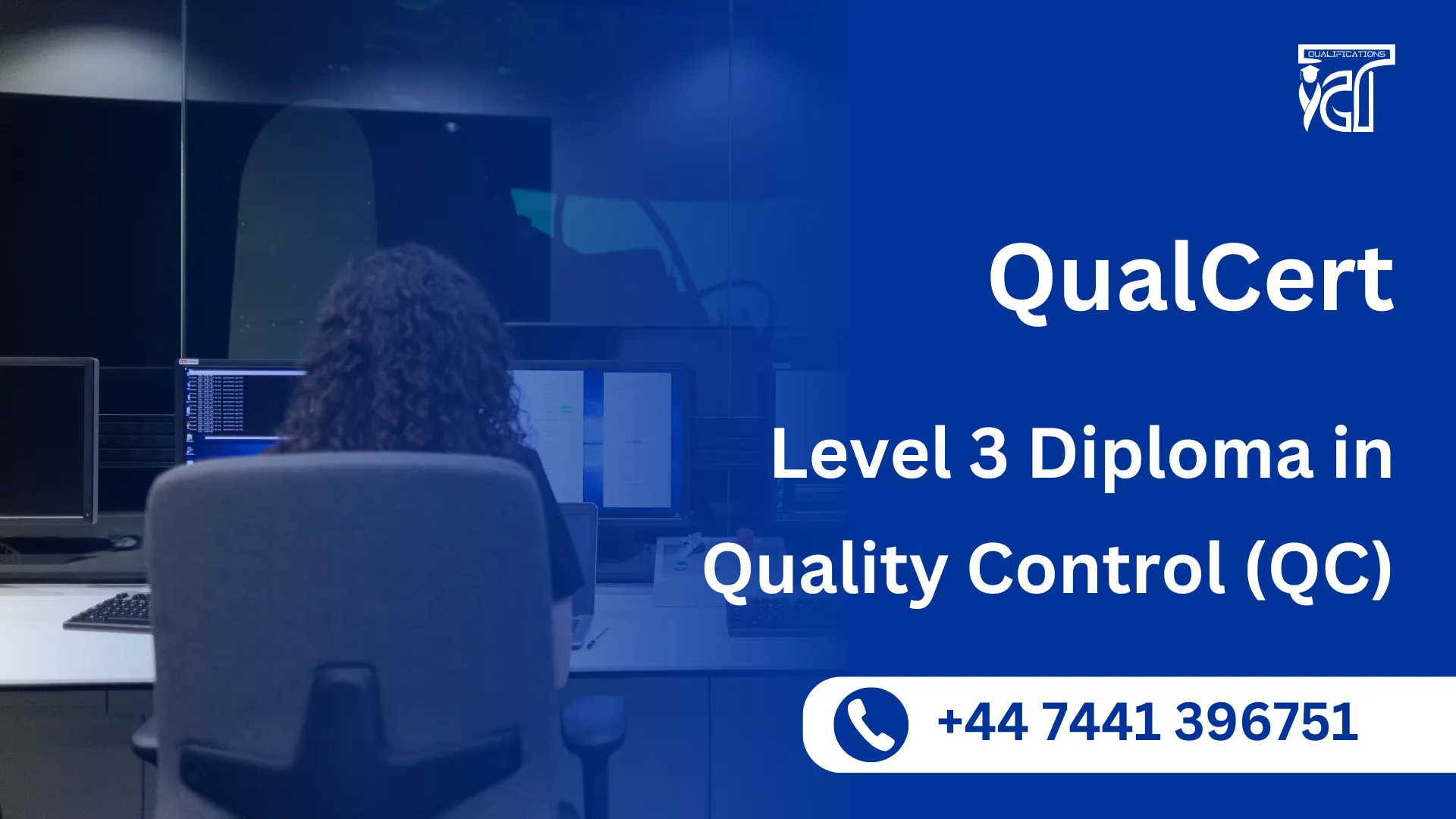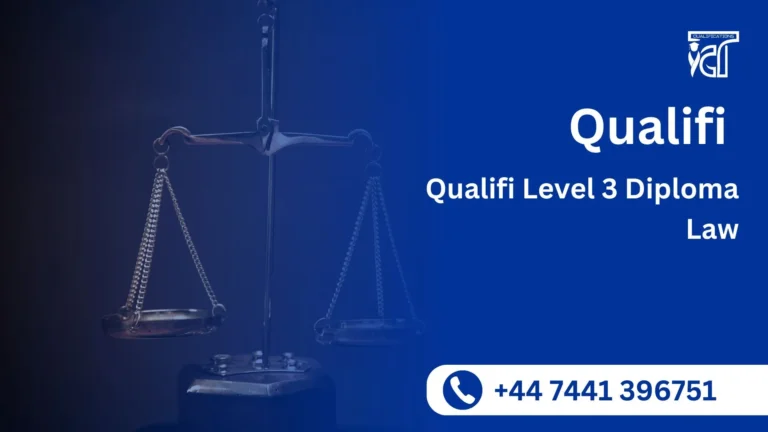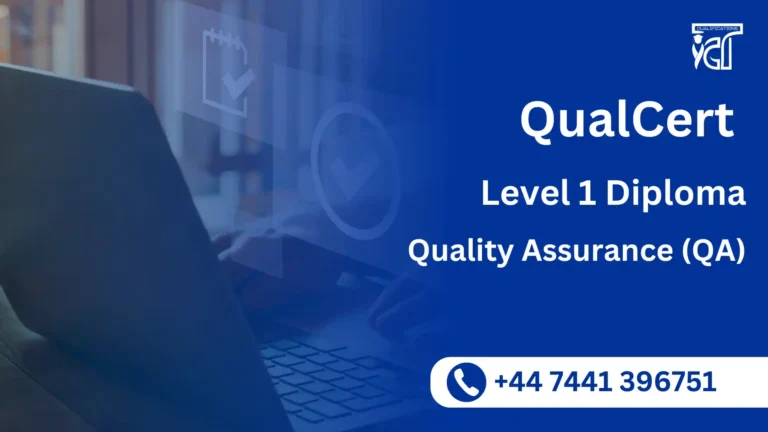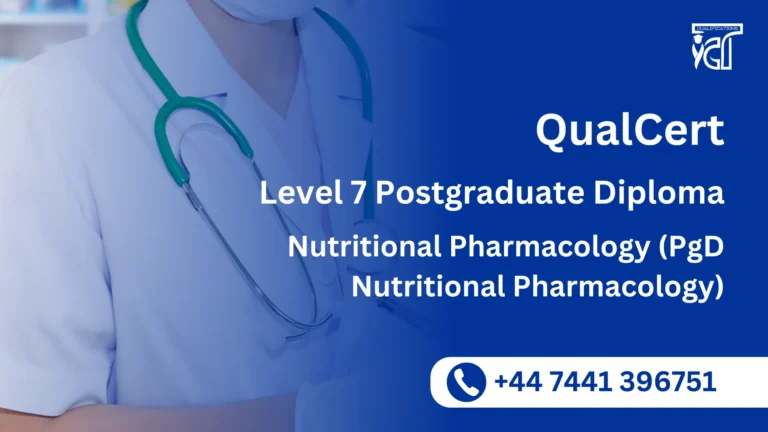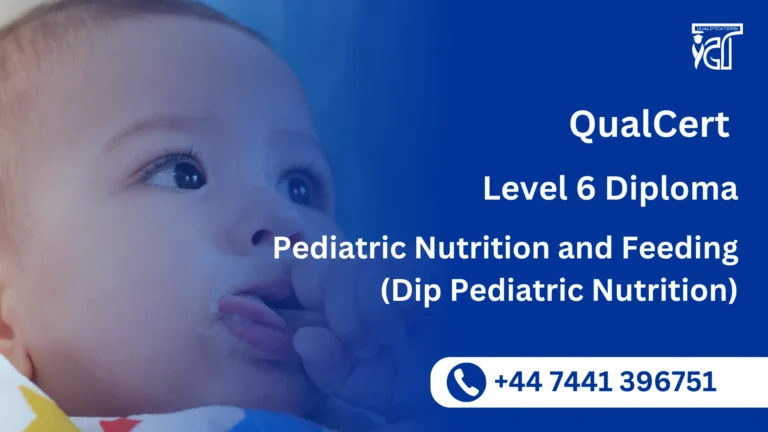In today’s increasingly competitive industries, the ability to maintain and improve product and service quality is a critical success factor. Quality control (QC) professionals ensure that processes meet set standards and customer expectations, helping businesses reduce waste, increase efficiency, and maintain a solid reputation. The QualCert Level 3 Diploma in Quality Control (QC) is a comprehensive, Ofqual-regulated qualification designed for individuals aiming to enter or advance in the quality assurance and management field.
This fully assignment-based diploma delivers a robust understanding of quality standards, inspection techniques, process control, and continuous improvement methodologies. Whether you’re seeking career progression, technical upskilling, or formal recognition of your quality management expertise, this diploma provides a flexible, career-focused solution.
The QualCert Level 3 Diploma in Quality Control develops both theoretical knowledge and practical expertise in quality systems and procedures. The course curriculum is designed in line with international standards, ensuring that learners are equipped to contribute effectively to quality initiatives across a wide range of industries including manufacturing, pharmaceuticals, logistics, engineering, food production, and more.
Delivered through flexible online learning and supported by industry-expert tutors, this qualification is ideal for full-time professionals, technical staff, and those aiming to step into quality-related roles.
The QualCert Level 3 Diploma in Quality Control (QC) provides learners with the essential tools, knowledge, and credentials to thrive in quality-focused roles across a broad range of sectors. With global recognition, a flexible learning format, and practical assessments, this qualification is a smart investment for anyone looking to build a successful career in quality assurance.
Take your next step toward professional growth—enrol today and become a leader in quality excellence.
QualCert Level 3 Diploma in Quality Control (QC)
This QualCert Level 3 Diploma in Quality Control (QC) course offers 40 Credits, requiring a Total Qualification Time (TQT) of 400 hours, including 200 Guided Learning Hours (GLH). It is designed for efficient and focused skill development in Quality Control (QC).
| Unit Ref# | Unit Title | Credit | GLH | TQT |
| QC01009 – 1 | Quality Control in Structural Engineering | 7 | 35 | 70 |
| QC01009 – 2 | Concrete and Steel Testing Methods | 7 | 35 | 70 |
| QC01009 – 3 | Environmental Impact of Construction | 7 | 35 | 70 |
| QC01009 – 4 | Statistical Methods in Quality Control | 7 | 35 | 70 |
| QC01009 – 5 | Risk Management in Construction Projects | 6 | 30 | 60 |
| QC01009 – 6 | Continuous Improvement in QC Practices | 6 | 30 | 60 |
GLH (Guided Learning Hours) and TQT (Total Qualification Time) are terms commonly used in vocational qualifications to help define the amount of time a learner is expected to spend on their studies.
1. GLH (Guided Learning Hours)
GLH refers to the number of hours a learner spends being directly taught, supervised, or supported during their course. This includes the time spent in activities such as:
- Classroom instruction
- Practical workshops
- One-on-one tutoring or mentoring sessions
- Online learning sessions with tutor support
In other words, GLH represents the time that learners are actively engaged with their instructors or learning activities.
2. TQT (Total Qualification Time)
TQT represents the total amount of time a learner is expected to invest in completing a qualification, including:
- GLH (Guided Learning Hours): Time spent on direct learning, as explained above.
- Self-Directed Learning: This includes time spent on independent study, research, assignment completion, preparation for exams, and any other work the learner does outside of direct teaching hours.
TQT is a broader measure that includes all the time required to achieve the qualification. It helps learners and employers understand the overall commitment required for the qualification.
Key Differences Between GLH and TQT:
- GLH focuses on direct learning with guidance or supervision.
- TQT includes GLH as well as independent study time and other learning-related activities.
Example:
If a qualification has a TQT of 600 hours and a GLH of 250 hours, it means the learner should spend 250 hours in direct learning (classroom, online, or tutor-led sessions) and 350 hours on independent study or research.
Upon successful completion of the Level 3 Diploma in Quality Control, participants can expect to achieve the following learning outcomes:
- Quality Control in Structural Engineering
- Understand the principles and practices of quality control within structural engineering projects.
- Develop the ability to assess and monitor the quality of materials, components, and structural designs.
- Identify and mitigate common quality issues in structural engineering processes.
- Implement effective quality control measures to ensure compliance with industry standards and safety regulations.
- Concrete and Steel Testing Methods
- Gain knowledge of the testing methods for concrete and steel materials used in construction.
- Learn to perform tests for material strength, durability, and overall quality of concrete and steel.
- Understand how to interpret test results to assess material performance and suitability for use in construction.
- Apply testing results to improve the quality and integrity of construction projects.
- Environmental Impact of Construction
- Recognize the environmental implications of construction processes and materials.
- Evaluate the environmental impact of construction activities, focusing on sustainability and eco-friendly practices.
- Develop strategies for minimizing the environmental footprint of construction projects.
- Ensure that construction projects comply with environmental regulations and standards.
- Statistical Methods in Quality Control
- Master statistical tools and techniques used in quality control, such as sampling, process control charts, and hypothesis testing.
- Learn how to analyze and interpret quality data to identify trends, issues, and areas for improvement.
- Apply statistical methods to monitor and control processes, ensuring consistent product quality.
- Use data-driven insights to make informed decisions in quality management.
- Risk Management in Construction Projects
- Understand the principles of risk management and its importance in construction quality control.
- Identify potential risks in construction projects, including those related to safety, quality, and compliance.
- Develop risk management plans and strategies to mitigate identified risks.
- Learn how to implement proactive measures to address risks before they impact the quality or success of construction projects.
- Continuous Improvement in QC Practices
- Gain a deep understanding of continuous improvement methodologies such as Lean and Six Sigma in quality control.
- Develop the skills to analyze existing quality control practices and identify opportunities for improvement.
- Learn to implement continuous improvement strategies in quality control processes to enhance efficiency and reduce defects.
- Promote a culture of continuous learning and improvement within quality control teams and across organizations.
Benefits of the QualCert Level 3 Diploma in Quality Control (QC)
The QualCert Level 3 Diploma in Quality Control (QC) offers a host of advantages, both professionally and personally. Whether you’re starting your career or looking to enhance your existing skill set, this Ofqual-regulated qualification provides a solid foundation in quality assurance principles and practices. Here’s how you will benefit from this course:
1. Ofqual-Regulated and Globally Recognized
This diploma is accredited by Ofqual, ensuring it meets the highest standards of education. As a globally recognized qualification, it enhances your professional credibility and opens up career opportunities in quality control across industries worldwide.
2. 100% Assignment-Based – No Exams
Unlike traditional courses, this diploma is entirely assignment-based, which means you can showcase your skills and knowledge through practical assignments and real-world tasks. This approach helps reduce exam stress while allowing you to focus on developing your expertise.
3. Industry-Relevant Curriculum
The course content is designed to meet the current demands of industries such as manufacturing, pharmaceuticals, food production, engineering, and more. You will learn critical skills in quality inspection, compliance, root cause analysis, and continuous improvement techniques that are directly applicable in the workplace.
4. Flexible Learning at Your Own Pace
The flexible online learning format allows you to study at your own pace, making it perfect for professionals, career changers, or anyone with a busy schedule. You can balance your learning with work and personal commitments, ensuring that you stay on track without disrupting your lifestyle.
5. Practical, Real-World Skills
This diploma focuses on teaching you practical skills that can be applied immediately in your job. You’ll gain hands-on experience with quality control tools, inspection techniques, and problem-solving strategies that will enhance your ability to contribute to any quality-focused team or department.
6. Career Advancement and Job Opportunities
With quality control being an essential aspect of many industries, this qualification opens the door to a wide range of job opportunities. Graduates can pursue roles such as Quality Control Technician, Quality Inspector, Compliance Officer, Production Supervisor, or Process Improvement Specialist.
7. A Stepping Stone for Further Qualifications
The Level 3 Diploma in Quality Control serves as a strong foundation for further studies. You can progress to advanced qualifications like the Level 4/5 Diplomas in Quality Assurance, Lean Six Sigma Certifications, or ISO Lead Auditor training, helping you specialize and expand your career potential.
8. Increased Employability and Salary Potential
As organizations continually strive for product quality, compliance, and efficiency, the demand for skilled quality control professionals remains high. Completing this diploma makes you more competitive in the job market and increases your potential for higher-paying positions and promotions.
9. Enhanced Problem-Solving and Analytical Skills
The course teaches you how to perform root cause analysis and implement corrective and preventive actions (CAPA), which are essential skills for identifying and solving problems effectively. These skills are highly valued in any role that focuses on maintaining quality standards and continuous improvement.
10. Supports Continuous Improvement Initiatives
As part of the course, you will learn key lean principles and continuous improvement methods such as Kaizen and Six Sigma. This enables you to contribute to your organization’s quality initiatives, improve production efficiency, and help drive sustainable process improvements.
By completing the QualCert Level 3 Diploma in Quality Control (QC), you’ll be equipped with a well-rounded skill set that can advance your career, enhance your professional standing, and position you as a valuable asset in any quality-driven industry.
The Level 3 Diploma in Quality Control (QC) is tailored for a diverse audience, including:
- Experienced Quality Control Professionals: Professionals already working in quality control, quality assurance, or related roles seeking to advance their careers and deepen their expertise.
- Quality Managers and Leaders: Managers and leaders responsible for quality control processes and teams, aiming to enhance their leadership capabilities and decision-making in quality management.
- Engineers and Scientists: Graduates and professionals with backgrounds in engineering, science, or related fields looking to specialize in advanced quality control
Entry Requirements
Register Now
Qualification Process
Qualification Process for the QualCert Level 3 Diploma in Quality Control (QC)
- Self-Assessment:
Begin by evaluating your eligibility to ensure you meet the qualification requirements, including work experience, knowledge, and language proficiency. - Registration:
Complete your registration by submitting the required documents, including a scanned copy of a valid ID, and paying the registration fee. - Induction:
An assessor will conduct an induction to confirm your eligibility for the course and explain the evidence requirements. If you do not meet the criteria, your registration will be canceled, and the fee will be refunded. - Assignmnets & Evidence Submission:
Provide all assignmnets and the necessary evidence based on the assessment criteria outlined in the course. If you are unsure of the required evidence, consult with the assessor for guidance on the type and nature of evidence needed. - Feedback and Revision:
The assessor will review your submitted evidence and provide feedback. Evidence that meets the criteria will be marked as “Criteria Met,” while any gaps will be identified. You will be asked to revise and resubmit if needed. - Competence Evidence:
Submit final evidence demonstrating that all learning outcomes have been met. This evidence will be marked as “Criteria Met” by the assessor once it is satisfactory. - Internal Quality Assurance (IQA):
The Internal Quality Assurance Verifier (IQA) will review your evidence to ensure consistency, quality, and compliance with standards. - External Verification:
The IQA will submit your portfolio to QualCert External Quality Assurance Verifiers (EQA) for final confirmation. The EQA may contact you directly to verify the authenticity of your evidence. - Certification:
Upon successful completion of all checks, QualCert will issue your official certificate, confirming that you have attained the QualCert Level 3 Diploma in Quality Control (QC).

